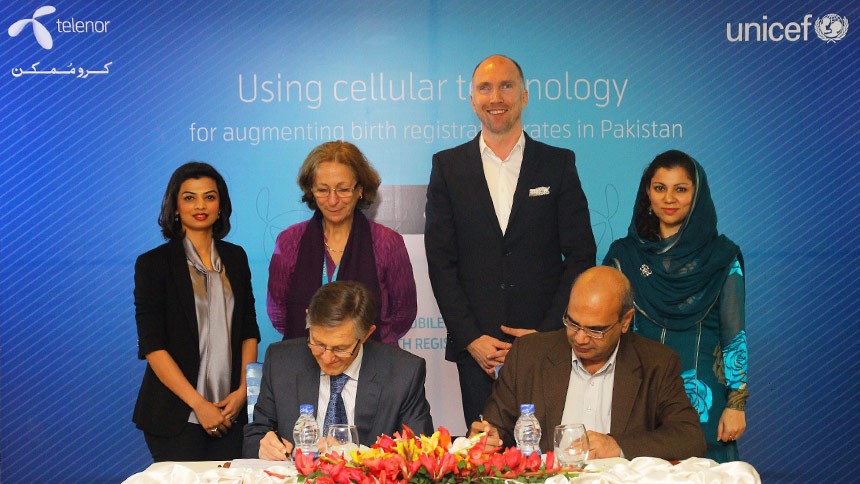ICT4D INITIATIVES
Mobiles for Birth Registration
In an effort to augment the present low birth registration rate with the help of cellular technology, Telenor Pakistan and UNICEF Pakistan jointly launched a pilot in 2014 to mediate child’s right to identity through mobile birth registrations.
Currently, the rate of birth registration in Pakistan is quite low due to various socio economic factors. Time, cost, travel, process hindrances and general lack of awareness all contribute towards exacerbating the situation. On the other hand, the ubiquitous prevalence and adoption of mobile technology in Pakistan has opened avenues that offer unprecedented potential for services and applications for masses at large. This unique pilot project aims to help create an enabling environment by making the process of birth registration user-friendly, and provide facilitation to citizens and other stakeholders through the use of technology and innovations.
A one-of-its kind initiative under Telenor Pakistan Corporate Social Responsibility umbrella, the project not only aims at increasing demand for registrations in selected Union Councils of Sindh and Punjab but will also induce a proactive approach towards bringing birth registration services to the public. The project will play a pivotal role in improved citizen interactions through process optimization, better planning and management of data for the government, and improved health awareness through uptake of mobile-health (m-health) services.
Government bodies such as NADRA and Union Councils will play an important role in this initiative. Additional components of the plan include Mobile Birth Reporting System; an Information portal consisting of a website, central helpline and SMS based pull requests; public service messages and m-health services.

E-education:
The E-Education project aims at providing top of the line e-education content to public/underprivileged schools in order to improve conceptual understanding & science attitudes, provide access to international level education content to the unconnected.
After running a successful pilot in Children’s Library Complex (CLC), Lahore, the e-education project kicked off in 5 additional public schools in Karachi & KP province through Idara Taleem-o-Agahi (ITA).
At Children Library Complex Lahore a total of 263 students from 7 public schools and 59 students from 3 private schools interacted with the eLearning module along with 40 teachers who participated in the orientation session. In Karachi a total of 400 students interacted with the eLearning module and 12 teachers from 2 public sector schools participated in the training sessions and their learning was gauged. In Swat total of 320 students from two public schools in along with 17 teachers participated in the sessions and their learning was gauged.
The final results showed improvement in comprehension, conceptual clarity and understanding of both the teachers and students.
Mother & Child Health Project, KPK
In 2014, in collaboration with MNCH program Govt of Pukhtunkhwa Telenor Pakistan initiated a unique pilot in 10 districts of KP to support mother and child health.
Pakistan’s Maternal and Child Health indicators remain extremely poor every year as 25,000 to 30,000 women die from complications of pregnancy and child birth. Millions more suffer ill health and disability. One million children die before the age of 5 while 16,000 die in the first month after birth.
The programme aims to support expecting women in rural/remote districts through an integrated approach. Upon checkup and delivery in Public Hospital and from Community Midwifes, each expecting woman receives a staggered monetary amount to improve nutrition intake, along with free medicines. Initially the project has been launched in 10 District Chitral, Shangla, Upper Dir, Lower Dir, Buner, Torghar, Kohistan, Battagram, Nowshera, Hangu, Lakki Marwat and Tank.
Along with disbursement support through Easypaisa, Telenor Pakistan also sends trimester-wise targeted text and voice-based messages through an intelligent system (in local language to transcend the literacy barrier) to remind expecting beneficiary mothers of their next appointment as well as collection of stipend.
Impact: A total of 100,000 beneficiaries (expecting mothers) will be reached over a period of 1 year
IT Equipment Donation
Under the policy of annually donating end of life ICT equipment and manifestation of its empowering society, Telenor Pakistan aims to connect the underprivileged segments of society with the information age and help them catch pace with the 21st century tools on equal footings with the rest of the society.
The first such donation took place at Pakistan Sweet Homes, where Telenor Pakistan equipped the lab with 5 desktop computers, 5 laptops, a laser printer and 5 smartphones with Telenor data SIMs. Assistive Technology Centers were set up at National Institute of Special Education as well as Special Talent Exchange Program premises. Telenor aims to continue to establish similar labs at other welfare organizations. Other organizations which received donation of an IT lab are:
- National Institute of Special Education
- Children’s Library Complex
- Development of disabled people organization (DDPO)
- Pakistan sweet homes
- Awareness Voluntary Organization (AVO)
- Information Resource Center on Disability (IRCD)
- National training center for special education (NTCSP)
- Center for intellectually disabled (MRC)
- Al-Farabi (center for physically disabled student)
- Read foundation (orphanage)
- Al-Qalm (Kashmir)
- Madadgaar (Karachi)
- Government Girls Primary School, Kahuta
- Sultana foundation- NGI
- Hamara Ghar
- Plan International
- Strengthening Participatory Organization (SPO)
Global Countdown
Telenor Pakistan takes the environment very seriously and believes that educating our next generations is the best way to ensure environmental sustainability through creating a more aware leadership for the future.
As part of this philosophy, Telenor Pakistan is working with the Children’s Library Complex and has installed a fun, yet full of learning, interactive simulation in the library which is utilized by school children to play a game where they have to take complex, ethical decisions to safeguard the future of the planet and ensure environmental sustainability. Over the course of the past couple of years, the simulation has reached and touched upon lives of hundreds of school-going children across Punjab through sessions arranged by the Children’s Library Complex.


